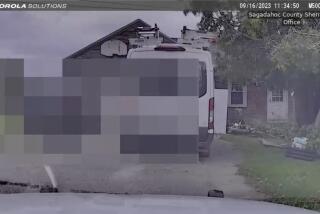Colorado shooting: What can college threat-assessment teams do?
The university psychiatrist who was seeing James E. Holmes, charged in the deadly mass shooting at a suburban Colorado movie theater, reportedly took her concerns about him to a school threat-assessment team.
Dr. Lynne Fenton told the campus Behavioral Evaluation and Threat Assessment team of her worries about Holmes, but no action was taken, sources told the Denver Post. The information was first reported late Wednesday by Denver’s KMGH-TV 7News.
University of Colorado-Denver officials would not confirm or deny the report, citing privacy restrictions and a gag order imposed by the judge in the Holmes case.
PHOTOS: Colorado movie theater shooting
But the reports highlight the existence of such teams -- part of an early warning system increasingly common at colleges across the nation -- and raise questions about precisely what the teams can, and can’t, do.
Holmes, 24, was enrolled in a doctoral program at the school’s Anschutz Medical Campus in Aurora. He faces 24 charges of first-degree murder in connection with the July 20 shooting that left 12 dead and 58 wounded. The attack occurred during a showing of the latest Batman movie, “The Dark Knight Rises.”
Fenton, who has been identified in a court document as Holmes’ psychiatrist, is the director of student mental health services at the campus. She also helped start the assessment team in 2010, said university spokeswoman Jacque Montgomery.
“She was a resource for the team,” Montgomery said of Fenton.
University Chancellor Don Elliman defended his school on Wednesday: “I believe, until it’s been demonstrated otherwise, that our people did what they should have done,” he said.
But what the threat assessment committee did – or didn’t – do could become a key legal issue at the complicated intersection of mental health and the law. Some of the related questions could focus on the criminal case; others could involve civil liability.
About 80% of colleges have some form of threat assessment team, Brett A. Sokolow, executive director of the National Behavioral Intervention Team Assn., said in a telephone interview with the Los Angeles Times. The association has 700 to 800 active members and serves as a clearinghouse for information related to threat assessment teams, including training and implementation.
The field surged after the 2007 massacre at Virginia Tech that left 33 people, including the gunman, dead. It has continued to grow with successive tragedies.
Committees vary by institution, but in general a threat-assessment committee is charged with evaluating reports that a student or an employee is having a problem. The group then decides the level of risk and devises a strategy on how to help the individual while protecting the college community, Sokolow said.
Membership in the committees usually includes at least one high-level administrator, a health service representative, a housing resident and a campus police officer.
“Teams don’t punish,” Sokolow said. “They are a caring and preventive mechanism.” They might make recommendations on short-term management of a problem or on longer-term help, such as counseling or medical treatment, he said.
It’s hard to evaluate such committees because success often means that nothing seemingly has happened. When you look at chat boards used by risk assessors, Sokolow said, “there are tons of success stories and people chiming in with great saves. Many wish the media would look at what we do, rather than just the down sides.”
Balancing the needs of the individual with the goal of making the college community safe can be tricky. Colleges generally face strict privacy laws governing students and patients but are also required under the Clery Act to give timely warnings of potential crimes that represent a threat to other students.
The committess have been linked to lawsuits, Sokolow said, including some still working their way through the courts.
Perhaps the most famous is the suit against Pima Community College, which suspended Jared Lee Loughner after he was identified as a person of concern by an assessment committee. Loughner has been charged in the 2011 shootings in Tucson, Ariz., that left six dead and 13 injured, including former Rep. Gabrielle Giffords. [Updated at 6:05 a.m., Aug. 4: Despite the talk of this suit, it hasn’t been filed.]
In one lawsuit, a school in Georgia and its former president were found to have improperly called for an investigation into the student’s mental health, employment and grades because the student opposed plans to build a campus parking garage.
ALSO:
Chick-fil-A ‘appreciation’ day: Frenzied sales set record
Three-plane crash narrowly avoided at Reagan National Airport
Tsunami debris: Oregon workers begin slicing up Japanese dock
Join Michael on Google+. Email: michael.muskal@latimes.com
More to Read
Sign up for Essential California
The most important California stories and recommendations in your inbox every morning.
You may occasionally receive promotional content from the Los Angeles Times.











